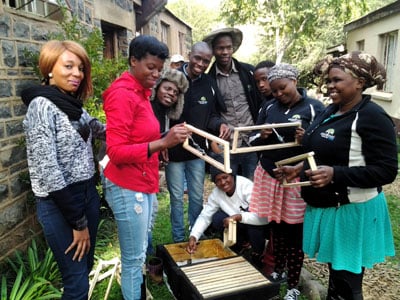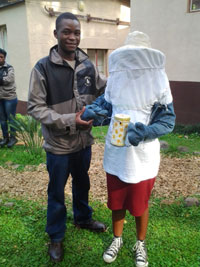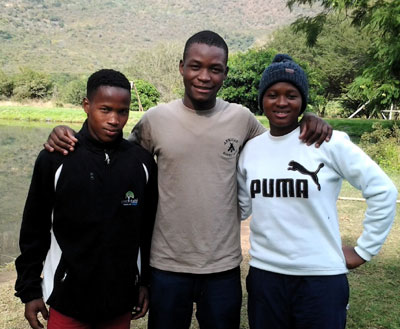
A group of young Abashintshi work on preparing a hive to capture a wild swarm in order to harvest honey.
The project is a community development initiative spearheaded by Sappi to involve the rural communities living in and around their operations across KZN in taking charge of their own futures instead of waiting for work or development to arrive from outside.
“We did some research and found that the very high levels of unemployment in communities meant that people were disillusioned and that there were often feelings of despair and anger. We decided that we needed to start making a change in these neighbouring communities,” comments Leander Jarvel, General Manager of Sappi Forests KwaZulu-Natal. The people who live near our areas of operation – our plantations and mills – often look towards Sappi for work. We can only employ a finite number of people, albeit directly or indirectly, but we can encourage young people in these communities to look for ways to create economic activities in their homes and communities. As June in South Africa is Youth Month, we are celebrating the young people who have grasped this opportunity with both hands.”
Working with a community development company called DevCom, Sappi agreed to fund a youth development project. It is called Abashintshi – the Changers – because the central concept was to identify young people in communities who had leadership potential, who could be empowered and groomed to go back to their communities and change lives for the better.

Tshepo Lebese congratulates Witness Chileza on her homemade beesuit, complete with smoker and hive tool.
“We identified nine communities neighbouring our plantations where there was a high level of unemployment and where we suspected communities were disillusioned,” says project facilitator, Fah Mbothwe, “and we started with putting up posters in those communities calling for young people to volunteer. We had several meetings, where we interviewed and selected our recruits. We chose young people who showed leadership potential, and who had matric.”
The young people – two from each community – were taken for an intensive four-day leadership course at a youth camp that concentrated on life skills and self-development, and importantly introduced them to a simple new concept called Asset-Based Community Development or ABCD, which focuses on appreciating and mobilising individual and community talents, skills and assets, rather than focusing on problems and needs. It deals with the ‘glass half full’ rather than the ‘glass half empty’ mindset and helps to guide communities in realising their own worth and the unique assets they have available. They then returned to their communities in order to roll out what they had learned. Every month, they return to the youth camp for another four-day course, where they feed back their progress in their communities and learn new personal skills.
“This has changed my life,” says twenty-year-old Witness Hlutankungu of Highflats. “I am now able to change the lives of the people in my community. After my first course, I went back to my home, and I organised a meeting where I spoke to the people about how to make more money. We have developed things like food gardens, brick-making, and food stalls. Instead of people going to the supermarket to buy food, they can now buy food from the people who grow it in their food gardens.”
“The people told me they have a problem with wild animals coming into their gardens to eat their vegetables, so I am busy getting donated wire so that they can build a fence to protect their crops.”
The project is now half-way through its second year, and the focus has now progressed from simple self-generated community projects to introducing more organised and lucrative economic activities.

Young changers: Msizi Lugaju (Abashintshi); Tshepo Lebese (African Honey Bee facilitator); Witness Chileza (Abashintshi)
“We looked for a simple economic opportunity in the areas where the people live,” says facilitator Mbothwe, “and we decided that keeping bees was a very good small-scale economic activity. The gum plantations already have wild bees that produce delicious eucalyptus honey, so this was the obvious choice. Bee-keeping is also something that everyone can do, and it requires very simple equipment.”
However, even that simple equipment can be expensive, so the bee-keeping project started right at the bottom, by teaching the young people how to make their own bee-keeping equipment from recycled materials. Although Sappi provides the first basic hive, the youngsters are taught how to make their own gloves and bee suits and smokers.
The bee-keeping skills are taught by a Christian social enterprise called African Honey Bee (AHB) that passes on the required skills and buys the honey produced by these micro-enterprises. Sappi Forests first decided to team up with this experienced enterprise development agency when they granted them access to Sappi land for their hives in Mpumalanga. Due to the success of that project Sappi then decided to expand their partnership by sponsoring the bee farming training of community members and small-scale timber growers in areas in Northern Zululand. Similarly this was an effort by Sappi to provide opportunities for locals to make some money from the sweet golden nectar, but by providing training in honey collection and bee-keeping to also reduce the number of fires started by honey hunters. Only those participants who complete the required tasks can continue to the next level of training so it requires commitment from the participating individuals. As honey production is seasonal, the training also teaches participants on some of the basics of vegetable and poultry production so that they can generate income throughout the year.
They teach people how to catch wild swarms in catch boxes, and use environmental and sustainable bee-keeping methods. The honey, once harvested by the local communities, is packaged and sold throughout South Africa in a Fair Trade agreement. From bee-keeping, AHB continues with agri-business training, encouraging small businesses – once they are getting income from honey - to keep chickens, grow vegetables and harvest fruit. The potential for development and economic growth is huge, and is already showing the benefits through the way that the young participants are being viewed by their communities.
“I have become interested in helping my village,” says twenty-two-year-old Msizi Lugaju, from Sutton near Ixopo. “I enjoy the fact that they are now respecting me, and they work with me to help themselves.”
Msizi began engaging his community by first approaching the local chiefs and introducing himself to his local leadership. Once he had their endorsement, he also called community meetings where they brainstormed better use of their local assets.
“It came as a surprise to people,” says Msizi, “when they realised just how many assets they had in their community that were unused. We began looking at all our talents, and asked ourselves: 'What can we do?' People used to think that the only economic opportunities were to get a job at Sappi, but now they are starting to realise that there are so many other opportunities that they can take.”
One great example of the changes that these young people have brought about is of a spaza store that increased its monthly turnover from R4,000 to R15,000.
“We are very excited about the changes we have seen as a result of this programme. There are more than 60 small enterprises that have flourished in these nine areas, since these young people have started changing mindsets from within. Our forestry staff are also reporting improved relations with community members, so all in all, we’re hoping that this will have long-term benefits for all involved in this programme," says Leander Jarvel. “We are ever optimistic that through education and awareness the people in our communities will grow in the appreciation of their assets and prosper as a result of this initiative. We believe that through development and engagement that communities will realise economic upliftment and the value of communication. We see the future as one where neighbours work together and support each other for the benefit of all,” he says.